Listen:
Scroll down for a transcript, video, how to subscribe, and more
Episode Synopsis:
Welcome to Episode #67 of Habitual Excellence, presented by Value Capture.

Joining us today as our guest is Denise Cardo, MD.
Dr. Denise Cardo is the director of the Division of Healthcare Quality Promotion (DHQP), National Center for Emerging and Zoonotic Infectious Diseases (NCEZID) at the Centers for Disease Control and Prevention (CDC). Dr. Cardo joined CDC in 1993 as a medical epidemiologist in the Hospital Infections Program (later named as Division of Healthcare Quality Promotion). After holding several leadership positions in DHQP, she was selected as division director in 2003.
Her interests include patient safety, occupational health, prevention of healthcare-associated infections, and antimicrobial resistance.
She’s recently the co-author of a NEJM Perspectives piece:
Health Care Safety during the Pandemic and Beyond — Building a System That Ensures Resilience
In today's episode, Dr. Cardo talks with host Mark Graban, about topics and questions including:
- Why should we aim beyond merely “getting better” and why should we be aiming for Zero Harm?
- Aim for “perfect healthcare with no harm?
- What are some practices that are not evenly distributed across the US?
- Working previously with PRHI - Ken Segel and Paul O’Neill?
- 70% decrease in harm showed what’s possible
- Preventing preventable infections or ALL infections??
- What is the role of CDC in promoting and partnering with healthcare organizations on patient safety? How has that evolved?
- Policies to incentivize - transparency and accountability
- Aligning payment to results… most countries aren’t there yet
- Please tell us how the CDC partners with CMS, AHRQ, and other federal agencies? With private advocacy groups?
- Focusing on Americans, CDC is a global leader — Collaboration or learning from similar organizations in other countries that are focused on patient safety?
- Lessons from the Covid pandemic? As you wrote about in the NEJM, why have we seen more patient safety problems recently, including more falls, more infections, more pressure ulcers in hospitals and SNFs?
- You and your co-authors wrote the recent trends “severely suggests that our health care system lacks a sufficiently resilient safety culture and infrastructure.”
- Disparities and equity - not just access to care, but “quality care”
- Moving forward, what evidence would you expect to see if we DID have a “sufficiently resilient safety culture and infrastructure”?
Click to visit the main Habitual Excellence podcast page.
Video:
Quotes:
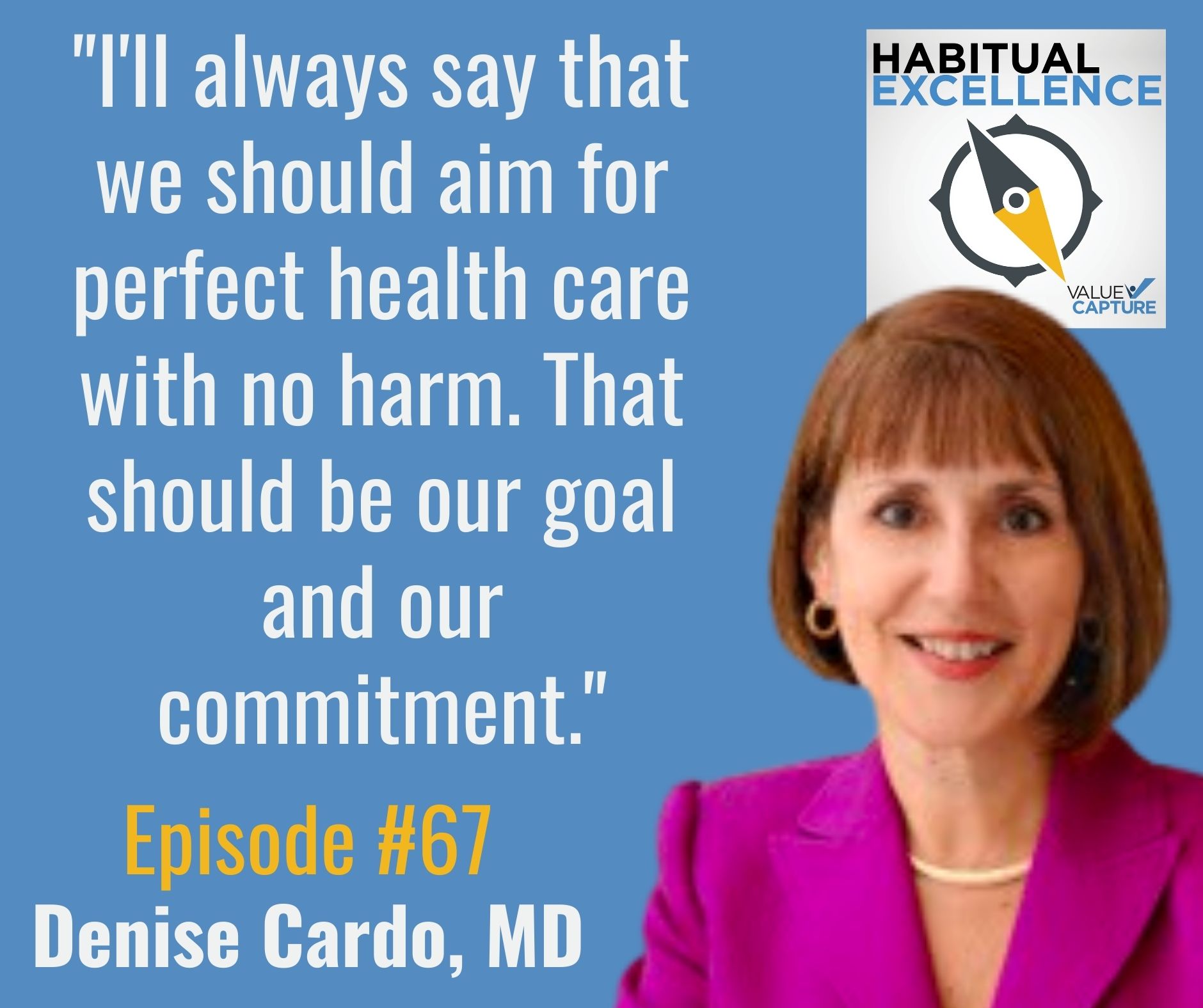
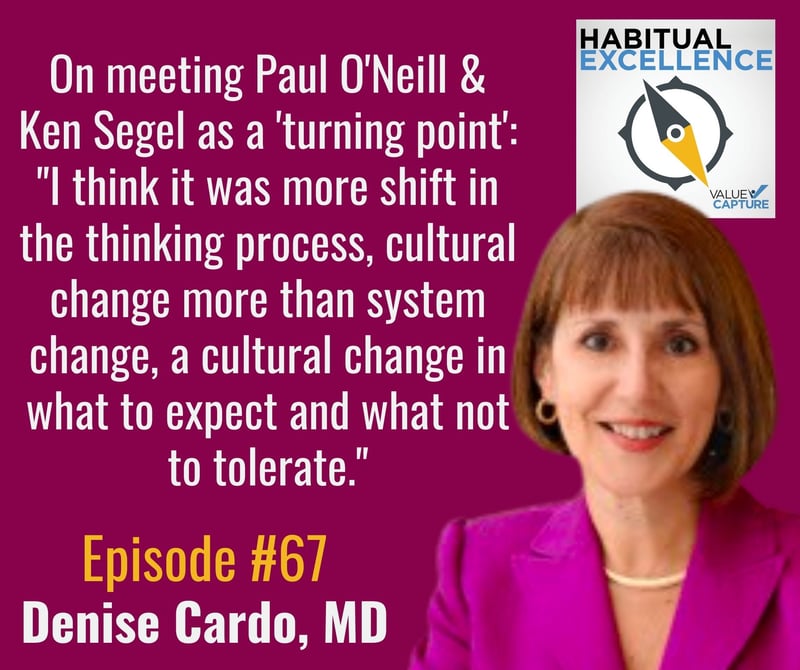
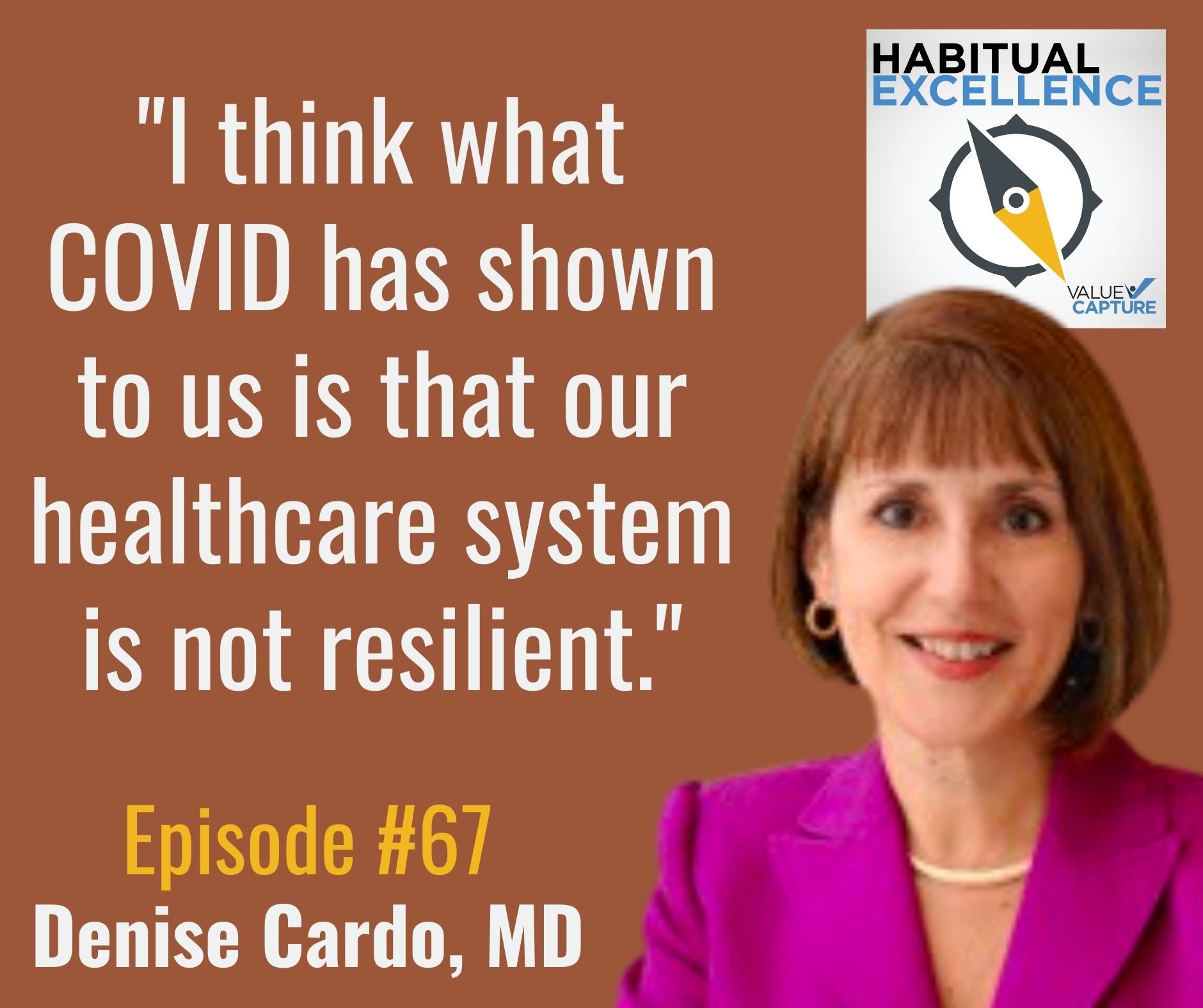 Subscribe:
Subscribe:
To make sure you don't miss an episode, be sure to subscribe today! Please rate and review the podcast.
Automated Transcript:
Mark Graban (2s):
Welcome to Habitual Excellence presented by Value Capture. This podcast, and our firm, is all about helping you and your organization. Achieve Habitual Excellence. Be a one unifying focus, one value based structure and one performance system. In other words, it's about helping you capture dramatically more value through achieving perfect care and perfect safety for patients and staff. To learn more about Value Capture and our services visit www.valuecapturellc.com. Well, hi everybody. Welcome to Habitual Excellence. I'm Mark Graban and our guest today is Dr.
Mark Graban (42s):
Denise Cardo. She is the director of the division of healthcare quality promotion, the national center for emerging and zoonotic infectious diseases at the Centers for Disease Control and Prevention or the CDC Dr. Cardo joined the CDC in 1993 as a medical epidemiologist in the hospital infections program later renamed the division of healthcare quality promotion after holding several leadership positions in DHCP, she was selected as division director in 2003. So Dr. Cardo interests include patient safety, occupational health, the prevention of healthcare associated infections and anti-microbial resistance. And she is recently the coauthor of a New England Journal of Medicine Perspectives piece.
Mark Graban (1m 25s):
We, I will link to this in the show notes, it's titled "healthcare safety during the pandemic and beyond building a system that ensures resilience." So with that, Dr. Cardo, thank you for being our guest here today. How are you?
Denise Cardo, MD (1m 38s):
Doing pretty good. Thank you for having me.
Mark Graban (1m 41s):
Well, I'm sure as the listeners know from your introduction, there's, there's no question why we have you here on the podcast today because your interests are our interest as well. And it's going to be great to hear your perspectives and experiences on these fronts. The first question for you, you know, what, what, how would you, how would you explain if somebody asks, you know, why should we aim for merely and beyond getting just a little bit better when it comes to patient safety? Why should we be aiming for zero harm as a goal?
Denise Cardo, MD (2m 19s):
I'll always say that we should aim for perfect health care with no harm that's should be our goal and our commitment, but you see, say this, we also need to understand that it's not a one time approach. The, you have to have the commitment, but also have to have a program and investments to really make it happen because we've learned. And there was a publication we did a few years, not two years, many years ago that it was for healthcare associated, moving towards elimination.
Denise Cardo, MD (3m 2s):
And it was a big debate debate. Can we do, can we not do? And then we decided, yes, that should be our goal. But also with understanding that to do that, we had to have programs that will include data. So we can really data for action. So we can not just track, but target interventions and see if they are working mutual, have a strategist and program stream implement everything. We know that works to protect patients. At the same time, we need to have innovation and research to address the pieces that we build now.
Denise Cardo, MD (3m 48s):
So it was always evolving and also we need to be prepared to respond to emerging issues. And when I say emerging issues, we may think COVID, it's not just COVID, it can be an introduction of a new technology, anything that can really change what we expect and, and more than anything else, we need to have policies that you incentivize all this and also to add transparency and accountability. And those are the pieces that we've seen the past 10 years with healthcare associated infections that has made a big difference.
Denise Cardo, MD (4m 35s):
But I think that's, I always say as a physician clinician working in public health at CDC, but also as a family member and a patient, that's what I want.
Mark Graban (4m 52s):
Yeah. I love, I love how you state that taking a beyond zero harm, but perfect health care. I think that's a really nice way of saying it.
Denise Cardo, MD (5m 2s):
Yeah. And like we were concerned in the beginning that sometimes for some people who don't understand the complex of healthcare that they could be, we think that if you got to zero, you were done and then anything that happens after that, it should be punished and that's not the case you have always should be prepared to is a quality improvement. So that's, it's that ongoing piece and you always need to have commitment and investment in all levels.
Mark Graban (5m 32s):
Yeah. And I appreciate that you emphasize that focus on learning and improvement instead of, instead of punishment. One follow-up question. When you talk about tracking and looking at doing everything that we know that works, is it fair to say that the progress in, in reductions in harm and the adoption of the things that we know that work, is it fair to say that these are not kind of evenly adopted across the whole of American healthcare organizations
Denise Cardo, MD (6m 8s):
You are correct? And that's one piece when we talk about what we do at CDC that is really making sure that we have programs and strategies to implement what we know that works in a way to continue to look at the data, to see are they doing everything and, and if not, why not? How can we help people to do? And, and that said, I think it's a, it's a very important, important piece. And, and sometimes people will not do it because they don't know or people would not do because they don't have the systems to do, or unfortunately, sometimes because they don't want to do.
Denise Cardo, MD (6m 57s):
But I think it's, it's, it's a very important piece. And, and that's what we learn when we worked many years ago with P RHI, the Pittsburgh regional healthcare initiative, because we thought that only 30% of us semi factions were preventable. And then when we show that if you really follow everything that we had in the CDC recommendations, and if you have a way to look at the data and feedback, the data just 70% decrease, and it was the same time as Peter Pronovost showing the same thing and that's, we prove that it was possible and he became the expectation.
Denise Cardo, MD (7m 43s):
So I think that's the important piece that you show that people implement what we know that works. You have very good feedback and that's should be the expectation for everybody else.
Mark Graban (7m 57s):
Yeah. I was going to ask you to, and maybe you can share a little bit more about that experience of working with Ken Segel from Value Capture with Paul O'Neill, because in, in the New England Journal of Medicine piece, you and and your coauthors, talk about the need to learn lessons from other industries. And I think that's one thing Paul O'Neill and Ken Segel have brought into healthcare. I'd be curious to hear some more your, your history with them.
Denise Cardo, MD (8m 24s):
I would tell you that it was a very important turning point for me and several of my colleagues. And I, I, I think it was more shift in the thinking process is that cultural change more than system change a cultural change in what to expect and what not to tolerate. And, and I remember the concept of saying, yes, the Alcoa that was under Mr. O'Neill had like the best program for preventing occupational injuries, but it was still injuries was still happening.
Denise Cardo, MD (9m 11s):
And so let's do everything. So we won't see the injuries, but again, it was empowering. Everybody was really doing, it becomes, as I said, it's a cultural change. So it's what everybody expects. And then you'll provide the systems and the tools and everything for people to be able to do in the beta. So that was for me and for a few other colleagues, very, very important. And even the discussion among experts that we want to prevent the preventable infections. And then it was why just the preventable. And then it's like, no, we want to prevent all the affections right now.
Denise Cardo, MD (9m 54s):
We know how to prevent some. But if we have the goal is to prevent or eliminate is really a much more, not just complex, but sometimes complex sounds like difficult, complex in a way that is really always learning, always improving. And this, when I say is a cultural change and is a cultural changing expectations, because that's what we're able to change in the country. People would say, oh, you always get any infection, how you expected that. So speak station's changed. And I would say that the engagement of patient advocates and the work we had to have with them is so important and has been so important because it's like, why would I set that, that case will be affected or that there is, so is a change in expectations.
Denise Cardo, MD (10m 51s):
But as I said, but always remembering, there's no magic bullet. There is no one time for itself, but always say as a federal agency, it's very important for us to define standards, expectations, and work with all the partners to move in that direction, because sometimes they how to move maybe different, but we all need to achieve a similar goal and measure that in a similar way.
Mark Graban (11m 23s):
So how would you describe the role of, of the CDC in working with healthcare organizations, whether it's hospitals, health systems, clinics, different settings, what what's the role of the CDC and partnering with them? Has, has that role evolved or changed over, let's say the past 10 or 20 years?
Denise Cardo, MD (11m 44s):
So the mission of CDC overall is to protect lives and improve health of Americans or people in the United States and abroad and, and it's data driven evidence-based approach. So the way I see that we, the way we have changed in terms of healthcare, CDC, traditionally would work more with public health partners. Okay. And with our program, we are like working more with the healthcare partners in the beginning, more with the hospitals, but it became very clear, especially when we really embraced the concept of elimination.
Denise Cardo, MD (12m 33s):
When we started working with also other federal agencies that public health and healthcare, if we don't work together, not just at the federal level only, or their organizations, but locally, we won't get to the goal that we have. So we work very, very closely with experts and in healthcare systems, healthcare systems, themselves organizations, private partners, and also the ones who pay for care. And, and one piece that is very important, always say is learning, not just from what we publish, but learning also for what is happening and talking.
Denise Cardo, MD (13m 23s):
So we also convene a lot partners to better define what is the best way for them to approach that problem before my Patricia's hospitals. Now, when we talk about preventing infections, improve antibiotic use preventing all harms it's hospitals, nursing homes, urgent care, ambulatory care, everything, and each group is different. So we need, so we really work on a lot with them and to always say to expectations are the same, but we have to tailor and target to what they have.
Denise Cardo, MD (14m 14s):
And, and also we, one piece that I think we it's important that we bring into the table is how to develop standards. And I said, oh, suspect stations, especially with data that can be used. And in the case of healthcare associated infections, we use the national healthcare safety network, plus other data sources and, and working with the healthcare system to say, to see what, how can they use the data and, and what other tools that we can provide to be helpful to them.
Denise Cardo, MD (14m 57s):
So we work with them for data issues implementation. And as I said, innovation, we also fund programs in all these states. And those programs have to work with the hospital associations with also the hospitals or nursing homes. And so that's what we do. And for the innovation, we also fund and support, not just academic centers, but also healthcare systems to see how can we make things better. And then we can show to the others how to, to improve in the same way.
Denise Cardo, MD (15m 41s):
My final thing is in DHB, in my division, we have a lot of expertise and we have many of the clinicians to work. And, and that's a critical piece because I want people to be also taking care of patients. So we are not just being in a world that is not the real one. So we do that also because I think it's, it's very, very important while we say that we can define expectations, standards, data, provide the data. If we don't work with partners, that will make things happen, it doesn't happen.
Denise Cardo, MD (16m 25s):
So that's, that's kind of the way we do in terms of working with healthcare. And I think with COVID became very clear that that connection healthcare, public health, if it doesn't exist, it's very hard.
Mark Graban (16m 43s):
And we'll, we'll, we'll come back to that in, in a moment talking about some of the impact of the COVID pandemic on patient safety. But I want to ask, you know, first Dr. Cardo, you talk about collaborating with other us federal agencies and health systems of all of all kinds. And, you know, the CDC, like you said, the focus is on the health of Americans. But I think, you know, the CDC is, is viewed as a leader in other countries. I think people look to the CDC for expertise and guidance at the same time. I'm wondering if there are collaborations with similar organizations in, from other countries of, of the work that they're doing to improve patient safety.
Mark Graban (17m 28s):
I'm curious how much sharing is happening in all directions across borders.
Denise Cardo, MD (17m 35s):
Thank you. So I can have an opportunity to talk about this. As I said, we work a lot with federal agencies. I think I will give example, especially with CMS, but also with arc. And so we, we really work with sister agencies. So it's not that we just align. We really work together to accelerate progress. And, and as I think it's a, it's a very, very important piece is, is really looking first to avoid duplication because we don't want you to increase burden for health care or anybody and, and all, and to move.
Denise Cardo, MD (18m 23s):
As I said to Western spirits and accountability, our work with CMS is critical for the alignment of practices, programs, and policies, not just because of the policies, becoming an incentive for the practices, they evidence based practices. But also because of the programs, CMS has programs like the quality improvement organization. We have programs in the state, we make them work together. And, and we also shared the data from the nature center in such a way that they can all use to really move towards improvement.
Denise Cardo, MD (19m 7s):
And Mike we're always looking and okay, what, why does not happen? What this a specific group is not improving? How can we improve? So is, is a work really together is ongoing work. And, and we do have the same goal arc the same thing, because some of the research questions that are coming with address questions that came for us and realizing and identifying gaps. So then we can use that for the implementation. So we really, the three agencies I know sometimes people think, oh, she's just talking.
Denise Cardo, MD (19m 49s):
No, we, we really work very closely on the basis. You'll mention international collaborations. It's very, very important. We work with a lot of colleagues from outside the us, and we work on a formal way, informal way. There's so much that we don't know when we talk about antibiotic resistance. Oh my God. So much we don't know. And then we learn, for example, in England, they're having a, an outbreak that it was a very bad bacteria resistant bacteria, and it could be related to the facets.
Denise Cardo, MD (20m 42s):
So, and then ended up that we're having similar thing in also in one place here in United States. So we convene and we started working together to see what first, how can we understand what is going on second? What are the innovations that can be done? So we work all the time. There is some outbreaks because now with everything being connected. So some outbreaks related to devices that happened not just in us, also happening in other places. And we tell each other, and we really work a lot too to see, not just to share knowledge but solutions.
Denise Cardo, MD (21m 25s):
And we convene meetings together. Like we at CDC with university of Geneva, that'd be way Cho ECDC. We just, we do every two years think tank, meeting nudges to address the no, but the unknown, how we move forward with even more aggressive impact. And so it's a, it's an ongoing thing. And, and we also work with who we fund that HOA and we have people there. So we, we really take that collaboration extremely serious because if we don't, we will not move towards the goal that we have that is really always improving to become perfect health care with no arms.
Mark Graban (22m 19s):
Oh, that's great to hear. And, you know, there are shared goals. Unfortunately, there is a shared problem. You know, the, the, the scale of patient harm, you know, on a per capita basis is very similar in other Western countries, at least from the data I've seen.
Denise Cardo, MD (22m 37s):
And it's interesting because the connection that we have with CMS then made possible to really embrace transparency and accountability. So for healthcare associated infections, you, especially for the hospitals, you can see what is going on in your hospital, using the CDC data that CMS posts. And, but at the same time, there is a way to align payment and he sent it to what is happening. And that's unique in most counters are not there yet. And that, and they even get very surprised when we say that we're doing this.
Denise Cardo, MD (23m 20s):
And I think it's in other things we're behind. So it's about,
Mark Graban (23m 26s):
Yeah. So the last thing I wanted to cover here, you know, was touching on things that you and your coauthors wrote about in the piece I mentioned earlier of, you know, this, this period of the pandemic, w w what seems to be data that shows a reverse of the trend of, of some progress of seeing in the last few years, an increase in falls, hospital, acquired infections, pressure, ulcers, other, other things like that in, in hospitals and skilled nursing facilities, how, how would you summarize the causes? How did the, the COVID era change, how care was being delivered in, in a way that led to this increase in harm?
Denise Cardo, MD (24m 13s):
I think what COVID has shown to us is that our healthcare system is not re resilience. And, and also there are the abuses that we knew and COVID made it even more clear to all of us. That one healthcare facility cannot be in isolation. You may have a hospital with the best program for preventing infections and everything patients move. If you don't have a system around you, facilities around you, but also have good programs, you'll never going to move in the direction you you need.
Denise Cardo, MD (24m 57s):
And COVID made that very, very clear. We are already seeing that with antibiotic resistance, but with COVID, it was just the movement between nursing homes, hospitals, community. So that piece is, I think is very, very important. You cannot work in isolation and also you need to have the lunches and good healthcare system, but a good public health, and they need to work together. So I think this is extremely important. The other piece that you, you mentioned, it was so first in, in the beginning, when we started seeing a problem with COVID, this was in March with discuss with GMs, and we thought that probably will be a burden for the hospitals to have to report the infections, the health test, us infectious.
Denise Cardo, MD (25m 53s):
And so it became a vote, a voluntary process. They were not related to, to the pain, despite that the hospitals continue to report, but show to us that they're seeing value in what they are reporting and using that information. So when we look at the data and we start seeing like things reversing, so all the great progress, 50 to 70% decrease of CLABSI decreases off at UGI, everything the opposite. And so they are, we know the patients were different, you know, more severe, but this has always say, it's not an excuse for us not to prevent.
Denise Cardo, MD (26m 38s):
And, but it also shows that all the programs are not sustainable. And we need to really think there are so many gaps. It's so easy to break the systems. And it's not that people didn't want to intervene to follow the recommendations. It's just, there was like no girls or a lot of system issues. And I think this is really showing how much we need to rethink another business. I, I, it was very important that COVID showed is the disparities and issues with equity and the access to care, not justice, not the same access to quality care, various that also it, when it needs to be addressed.
Denise Cardo, MD (27m 32s):
And, and the health care force, the healthcare worker for workforce people are tired, exhausted, and facing. I just many issues at work, but then concern that if they'll get an infection, they will bring home. And so we need also to rethink about how to better structure that in terms of number of healthcare providers, not, I'm not just talking about clinicians, I'm talking about everybody that probably we really need.
Denise Cardo, MD (28m 14s):
So I don't think it's just, when we think about systems, it's systems with people. And I do think we need to look at that. We, we learn for example, that we all know that the ones who work in healthcare don't have time for training. So now it's, you see, we develop and lounge the project for slime to train the first line. People, not just some, but, and in a way that is very easy tools and videos. And what also we learn is you don't just tell people what they need to do.
Denise Cardo, MD (28m 59s):
You explain the why, because when you explain the why they, you figure out a way to explain it, why they are doing the importance of that to protect the patients in themselves really is also is critical because they, they start to incorporate that in everything they do. So we also changing the way we, we work. We've helped people here, so it's not just healthcare industry change. We all need to change in terms of the federal agencies and the, and associations and the payers. But I feel bad. We don't have this solution, but the fact that we all acknowledging that, and the fact that he invited me to even talk, I think, is critical because I think it's that it's a commitment to not just fix the system, but do much, much better in moving forward.
Mark Graban (29m 58s):
So maybe one final question for you on that theme of moving forward in, in the article, you and your coauthors use phrases. I think of what you would want to see as an ideal. So two phrases I'd like to hear your thoughts on the one you already used in this interview, sufficiently resilient, safety, culture, and infrastructure. And then the second thing you mentioned is an unflagging commitment to safety. So what would be some evidence that you would expect to see of that becoming the case in American healthcare, both that safety culture that's resilient and having an unflagging commitment to safety. How do we know if that's happening?
Denise Cardo, MD (30m 39s):
I think the first piece is when we sit together to fix it and we don't come up with excuses and, and that's what I say, no blaming, nobody do this. We all. So for the whole problem we faced. So I see it's really when see down and, and for fixing the problem, I see that things are better when we have less criticism about the data, if it's needed or not, but the use of the data for action.
Denise Cardo, MD (31m 22s):
And I think this is a critical piece. I, I, I, for me, having people sitting to really fix without blaming and without excuses is a critical first step to see that we're moving towards the solution and is going to be many, many, many options. The great thing about the article is the number of people who reach out to us to be part of the solution, like, okay, we want to share with you what we are facing and what they should ways moving forward. I thought it was fantastic because initially I thought, okay, they are going to say, no, you're wrong.
Denise Cardo, MD (32m 7s):
No people were like, no let's. So I see that's a critical piece. And so now we need to start moving forward with concrete steps. We need to move forward, not just in terms of the health guesses infections and patient safety. I think we also need to move forward with better preparedness of our healthcare system. I think we have enough information and data that we look and see there, parts of the country, they are more prepared than other parts, their specific institutions, they are more prepared they are.
Denise Cardo, MD (32m 48s):
And when I say prepare is even having the PPE is I'm not saying exercises, I at CDC, the commitment, and I know also from CMS and that we want to put those things at the table and start moving forward. And so I, I will be happy if we really use that as the opportunity, as I say, as the enzyme to change the system, it's not going to be easy, but we have to stop.
Mark Graban (33m 30s):
Well, thank you for sort of laying out that challenge and the ideal condition we're working toward. I appreciate your thoughts on it. Not being easy, that there are no silver bullets, but more collaboration, more learning, more action, less blaming. Those are things moving us in the right direction.
Denise Cardo, MD (33m 48s):
And one piece I learned that things had worked well and things that did not work well and is trust is very important. So I think we working together and I think that's one piece with CMS. CDC is the trust. It doesn't mean you have to agree, but at least, you know, that the inpatient you trust in the goal, in the commitment, there was a trust on that. So I think this is very important. The other important pieces, clear roles and responsibilities, I can anticipate that many groups will say, no, no, we are going to do this.
Denise Cardo, MD (34m 30s):
I'm like, no there's space for everybody. Let's not try to destroy what is there. Let's try to build upon what we have, but with really the goal of doing better. So I don't, I think it's like improving what we have is a good way to, to start what we do. And, and like I said, roles and responsibilities and avoiding parallel actions. I think the more we can be really focused, I think the better we will, this define very concrete targets for us to accomplish.
Denise Cardo, MD (35m 10s):
So, and, and I'll be happy in the future to even come and say, are we accomplishing what we need to accomplish or not? And if not, whether we're doing to, to move in that direction.
Mark Graban (35m 26s):
That's great. Well, thank you so much, Dr. Cardo. Again, our guest today has been Dr. Denise Cardo from the CDC, the Centers for Disease Control and Prevention. Really enjoyed that article. I'll put a, again, there's the link in the show notes to that. And we hope people will read that article and, and think about what that means for them and their patients and their organizations. So again, Dr. Cardo, thank you so much for being a guest here today.
Denise Cardo, MD (35m 53s):
Thank you so much.
Mark Graban (35m 56s):
Thanks for listening to Habitual Excellence presented by Value Capture. We hope you'll subscribe to the podcast and please also rate and review it in your favorite podcast, directory or app to learn more about Value Capture and how we can help your organization on this journey to Habitual Excellence, visit our website www.valuecapturellc.com.
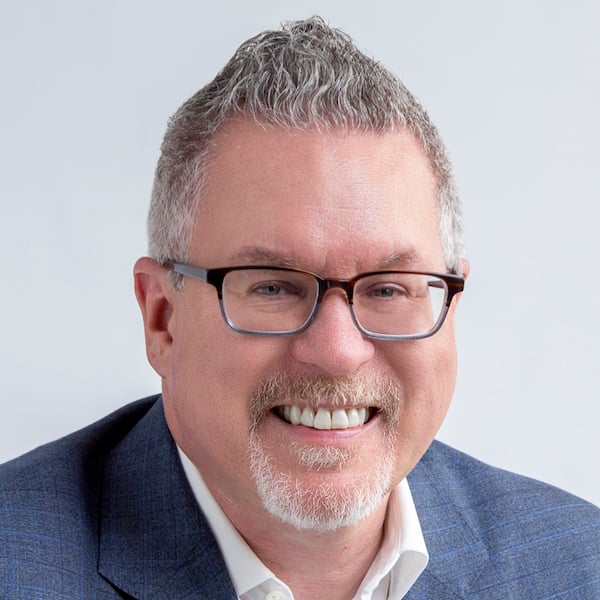
Written by Mark Graban
Mark Graban has served healthcare clients since 2005. Mark is internationally recognized as a leading author and speaker on Lean healthcare. His latest book is "The Mistakes That Make Us: Cultivating a Culture of Learning and Innovation."

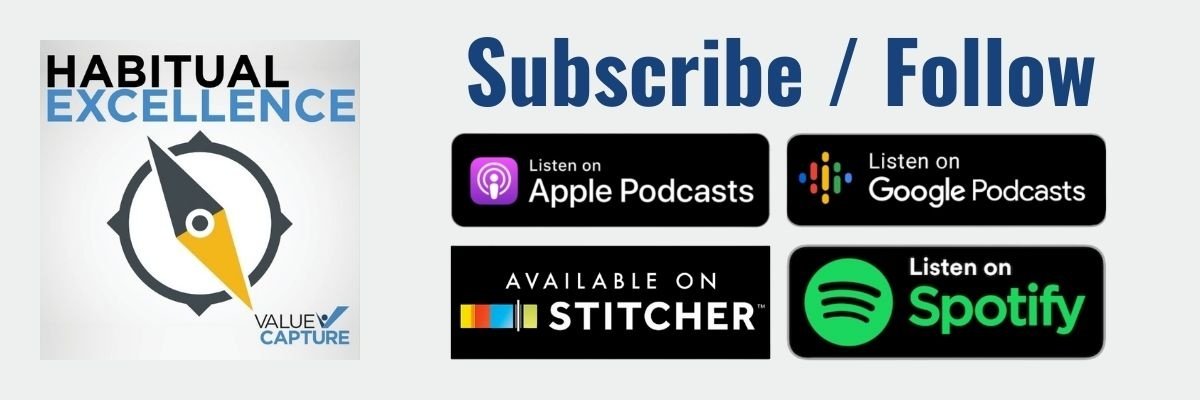
Submit a comment